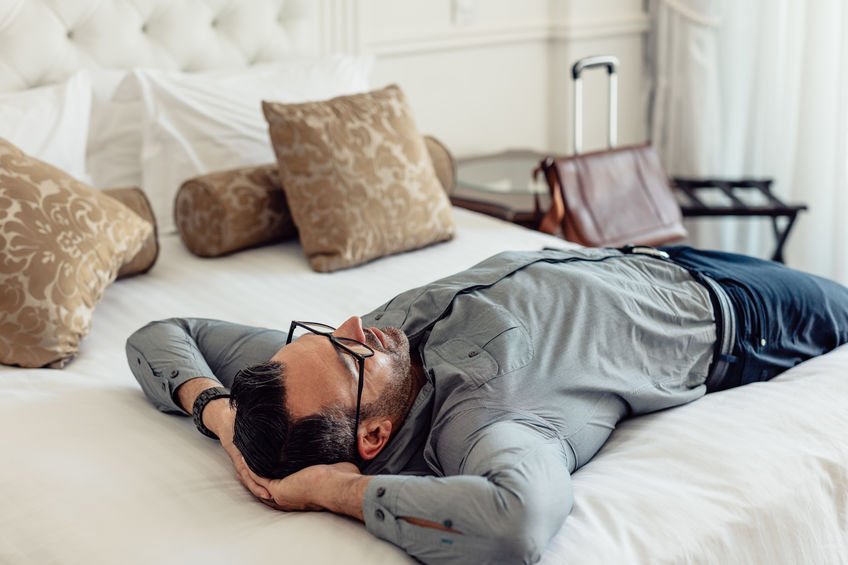Traveling can be an exciting and rewarding experience, but it can also disrupt your sleep routine and leave you feeling exhausted or jet-lagged. Whether you’re crossing time zones, sleeping in unfamiliar places on mattresses that aren’t yours or dealing with noisy environments, getting a good night’s sleep when you’re traveling can be a real challenge.
The Center for Disease Control (CDC) recommends that American adults should be getting at least seven hours of sleep each night. Sufficient amounts of sleep improve cognitive function, increase alertness during the day and reduce the risk of developing health conditions such as obesity, heart disease, Type II diabetes and mental health problems. To prevent traveling from disrupting your sleep quality, continue reading to discover nine habits you can implement in your travels to maintain a healthy sleep routine.
1) Research Your Destination
Traveling to another location can be exhausting, so knowing as much about your destination before you leave can make the arrival a smoother experience and prepare you for any sleep-related challenges. Research the destination’s time zone, so you can adjust your sleep, as well as the local customs and culture so that you understand when and how to respect quiet hours and other sleep-related practices in the area.
2) Pack Comfort Items
Being away from home makes it challenging to maintain your sleep routine, as you cannot always access the items that help facilitate this. Bringing a travel pillow, cozy blanket or items that remind you of home can help you relax in unfamiliar surroundings. In addition, if you are traveling with children, a familiar blanket or toy can help them feel at ease in their new surroundings. Other items that can help you sleep while traveling are earplugs or noise-canceling headphones and an eye mask to block out light.
3) Book with Comfort in Mind
When you are booking accommodations, it is essential that you are booking with comfort in mind. Research has found that the quality of your accommodation can significantly impact sleep quality. This can include the facilities, such as light and sound, as well as the sleeping environment, including the temperature, mattress and air quality.

When booking your accommodations, look for reviews that include details about features such as lights, noise, temperature control and bedding quality. You can also investigate Airbnbs, which can offer higher-quality beds, bedding pillows and comforters. There’s a big difference between accommodations with a high-quality Nectar mattress and a cheap, budget mattress — and it’s worth paying for.
4) Keep Jet Lag at Bay
Jet lag caused by crossing time zones is one of the most significant disruptions to restful sleep when traveling. The sudden change in time can disrupt your body’s internal clock, making it difficult to fall asleep at the right time and stay awake during the day. To avoid jet lag, when possible, gradually adjust your sleep schedule to the new time zone before you depart. Even just a few hours closer can make a difference. Once you arrive at your destination, get as much natural light as possible and try not to stay up late to help set your internal clock to the new time zone.
5) Make Sleep a Priority
The CDC’s number one tip for improving your sleep quality is to have a consistent sleep routine. By going to bed at the same time every night and waking up at the same time every morning, your body will find it easier to fall asleep and stay asleep, no matter where you are.
While traveling, plan your activities so you have enough time to get back to your accommodation and fit in at least seven hours of sleep. Also, try to avoid drinking caffeine or alcohol after midday or before heading to bed. Keeping a regular sleep schedule will help you to sleep when you need to.
6) Get Moving
When you are traveling, it is easy to get swept up in the activities and forget to be physically active, but this can be really helpful with fighting jet lag and getting sleep. The CDC encourages exercise to improve your sleep, as being physically active during the day can tire you out and make it easier to fall asleep
You can check out whether your accommodations have gym facilities that you can use. If these aren’t available to you, you can take a walk around your destination or do some yoga by following a YouTube video.
7) Stay Hydrated
Staying hydrated is important to maintain your health and energy levels. Dehydration can cause headaches, fatigue and other symptoms that can interfere with sleep. It can be easy to forget to stay hydrated while traveling, so carrying a refillable water bottle helps maintain your hydration levels. You can also eat fruits and vegetables with high water content and avoid drinking too much caffeine and alcohol to prevent dehydration.

8) Watch Your Caffeine Intake
Not only does caffeine deplete the water levels in your body, but it is also a stimulant that can interfere with your ability to fall and stay asleep. So, while it may be tempting to consume caffeine to stay energized while fighting jet lag, it can disturb your sleep quality, leading to a vicious cycle of sleeplessness and daytime fatigue. If you cannot go without your favorite caffeinated drink, try to limit what you consume before midday and swap this for a non-caffeinated tea or drink in the afternoon.
9) Have a Relaxing Ritual
A relaxing ritual can be a great way to wind down and prepare your body and mind for sleep when traveling. This can include activities such as reading a book, meditating, listening to soothing music or taking a warm shower or bath. The key is establishing a routine you can do in any environment, familiar or not. By making this routine a regular part of your bedtime routine, you can signal to your body that it’s time to wind down and get ready for sleep, which can help you fall asleep faster and more soundly.
Final Thoughts
Sleeping well when traveling is essential for feeling rested, alert and ready to enjoy your trip. By packing comfort items, planning ahead, booking appropriate accommodations and many more helpful methods, you can minimize the effects of jet lag, create a more relaxing sleep environment and improve your overall sleep quality while away from home.






